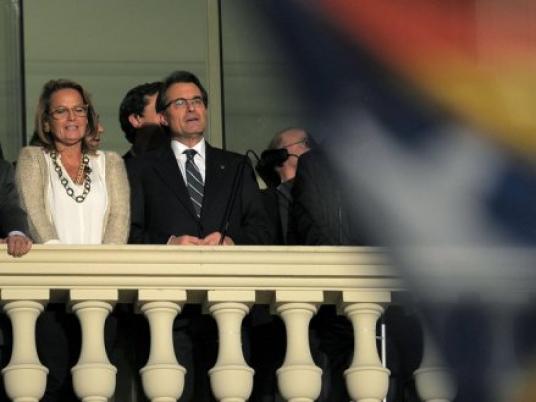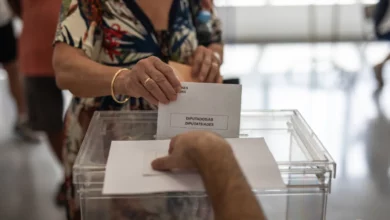
BARCELONA — Catalonia's fight for statehood and a historic divorce from Spain floundered Monday after a snap election left no single party in command.
Pro-sovereignty parties from right and left emerged with a clear combined majority, but the prospects of them joining in battle for a new nation were deeply uncertain.
That could be good news for Prime Minister Mariano Rajoy, who has vowed to block any break-up of Spain, saying it flouts the constitution and flies in the face of common sense.
The Spanish leader is demanding unity as he ponders seeking a bailout and struggles to overcome a deep recession, banking crisis, bloated deficit, and a 25-percent unemployment rate.
Catalan president Artur Mas called Sunday's election two years early, pleading for an absolute majority as a mandate to organize a referendum on self-determination within four years.
But it looked like a gamble gone horribly wrong after voters turned out in massive numbers to trim his majority instead.
"Mas' plan sinks at the ballot box," blared the front page of Spain's leading newspaper, centre-left daily El Pais.
"After asking for an 'exceptional majority', ending up with less than an absolute majority was a failure; but ending up far from that implies a spectacular failure," it said.
Mas' centre-right nationalist alliance, Convergence and Union, remained well ahead in the vote but its share of the 135 parliamentary seats plunged from 62 to just 50.
Republican Left of Catalonia, a left-wing pro-independence party, surged from 10 seats to 21.
"We are clearly the only force that can lead this government, but we cannot lead it alone. We need shared responsibility," Mas admitted to supporters in Barcelona after the vote.
"The presidency must be taken up, but we will also have to reflect along with other forces," said Mas.
The Socialists, the main opposition party nationally, came third in Catalonia as their share fell to 20 seats from 28 and Rajoy's Popular Party scored 19.
The prospect of a break-up of Spain had overwhelmed pre-election debate about the region's sky-high public debt, savage spending cuts, unemployment and recession.
Mas, like many Catalans, accuses Madrid of raising far more in taxes from the region than it returns, a shortfall he estimates at 16 billion euros (US$21 billion) a year.
Emboldened by a protest of hundreds of thousands of people in Barcelona calling for independence on Catalan national day 11 September, Mas decided to seek greater tax powers.
But when Madrid refused, he called the snap election.
Catalonia, which traces its origins back more than a millennium, is proud of its language and culture, both of which were suppressed under the rule of General Francisco Franco, who died in 1975.
Catalans would vote in favor of a referendum on self-determination by 46 percent against 42 percent, according to a survey before the election in leading daily El Pais.
The region of 7.5 million people now accounts for more than one-fifth of Spain's economic output and a quarter of its exports, and boasts one of the world's best football teams, Barcelona FC.
But Catalonia also has a 44-billion-euro debt, equal to one-fifth of its output, and was forced to turn to Madrid this year for more than five billion euros to help make the payments.
Mas' party had never previously favored absolute independence from the rest of Spain, said Joaquin Moline, political science professor at the Autonomous University of Barcelona.
"This first time (that) they have campaigned with the formula of a proper state has been a complete failure," he said.




